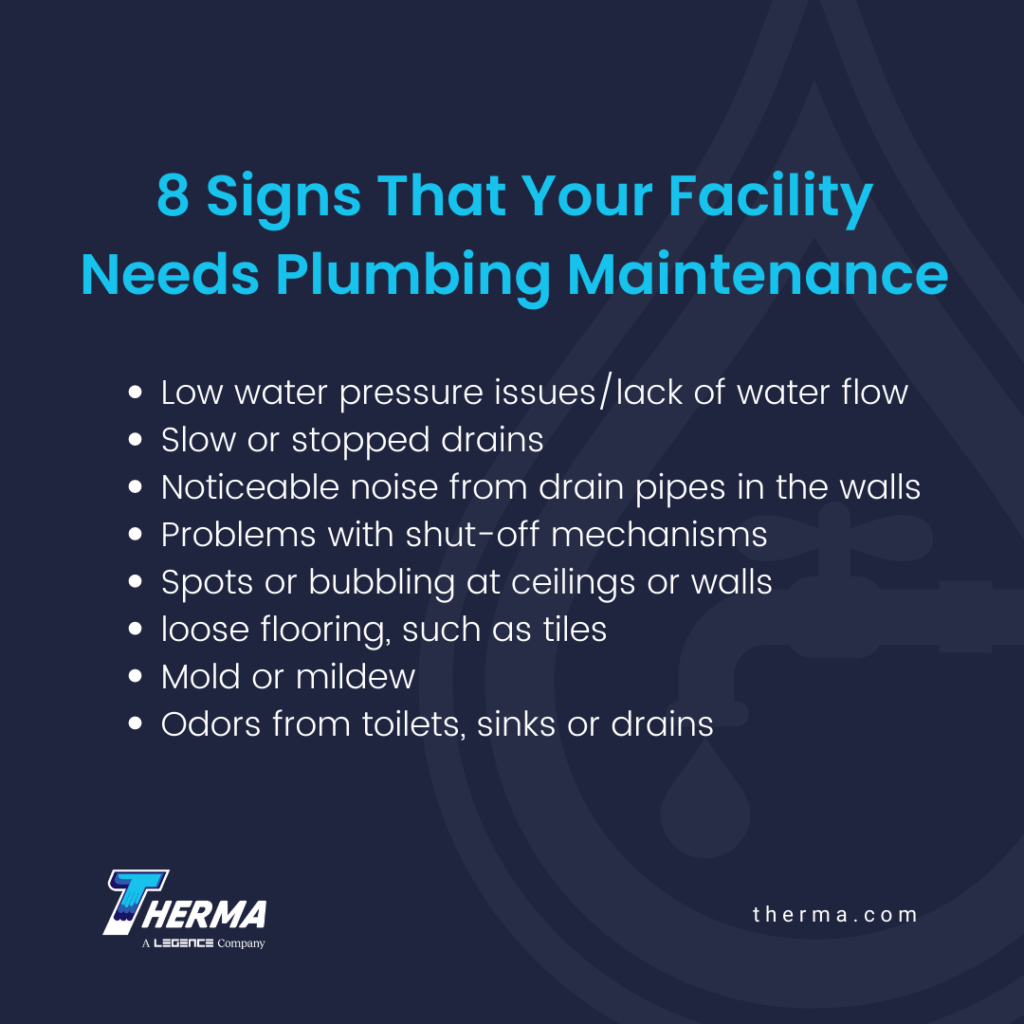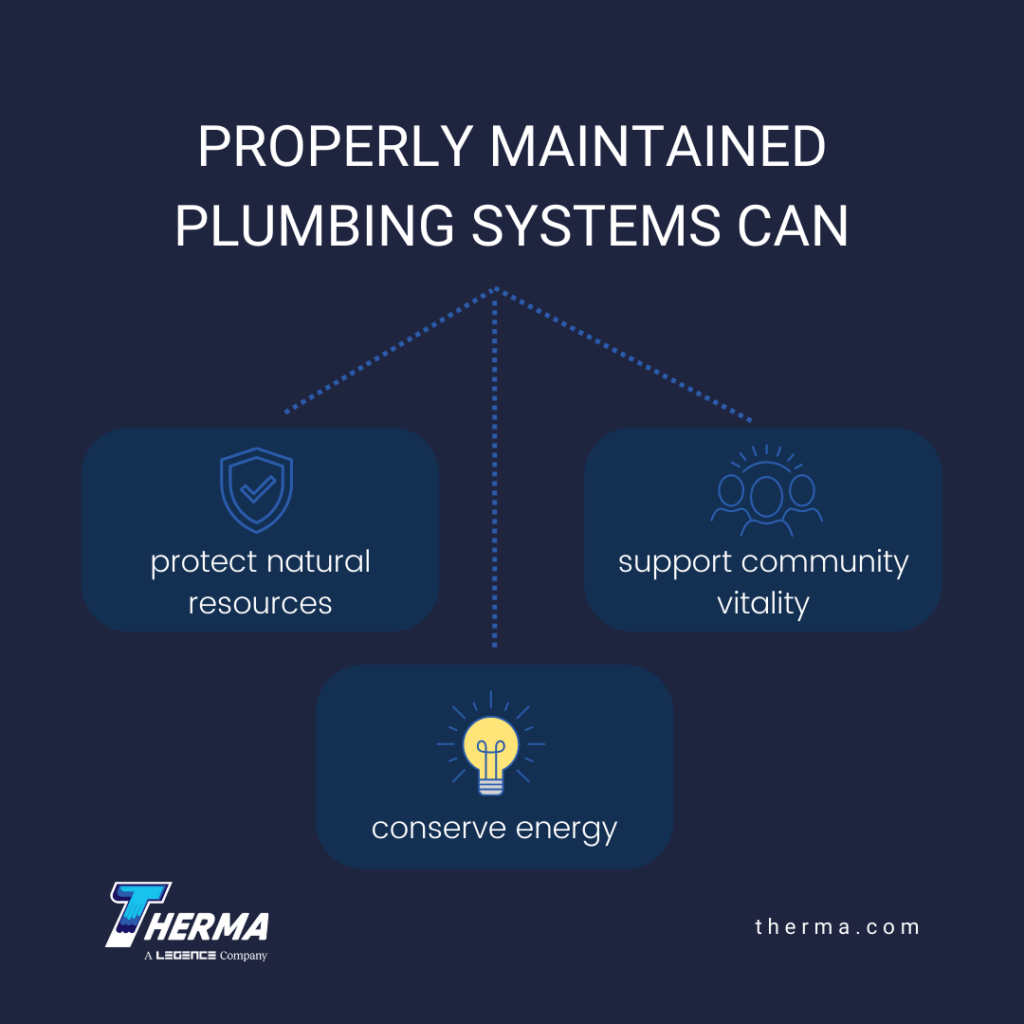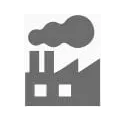by Ali Kriscenski
Plumbing is often viewed as a less complex building system compared to electrical or mechanical systems. However, plumbing systems are a critical part of building functionality and safety, often serving other systems and playing a key role in operational continuity. More importantly, plumbing failures can be costly and disruptive events making regular plumbing maintenance a top priority.
In this article, we’ll take a look at what plumbing maintenance should include, how often it should be performed and the benefits for building and facility operations.
Importance of Plumbing Maintenance
Plumbing systems are a network of pipes, valves and devices that control the flow of water in and out of buildings. At a base function, they ensure sanitary conditions, potable water and modern services such as lines to dishwashers, laundry and refrigerators. Properly maintained plumbing systems help protect natural resources, conserve energy and support neighborhood and community vitality.
Older plumbing systems that haven’t been well maintained can create lowered water pressure and high mineral content such as iron that creates ‘hard’ water and even is a source of health problems for building occupants. One of the biggest dangers from old pipes is lead contamination that can leach into drinking water causing myriad health issues including headaches, fatigue, nausea and reproductive problems.
In facilities that house manufacturing processes or other activities that produce contaminants, plumbing maintenance becomes part of larger regulatory compliance. Chemicals and pollutants in wastewater of medical, pharmaceutical, food processing and other industries can become a source of waterway contamination if not properly managed. The maintenance of industrial plumbing systems can encompass a wide range of piping material, flow and monitoring devices, containment, drainage, temperature and other variables on a multitude of scales.
What Plumbing Maintenance Should Cover
There are many signs that your plumbing system could benefit from regular maintenance. These include slow drains, low water pressure, noisy pipes, water leaks and odors. Before these issues cause damage and costly repairs, setting up a regular maintenance program can ensure the system gets proper treatments and ward off any operational disruptions.
Plumbing maintenance, for any type or scale of system, should include:
- Inspection of water pressure
- Integrity of water control devices
- Calibration of water monitoring devices
- Testing of water drainage
- Checking for water leaks
- Inspection of discharge or wastewater management systems
- Plumbing systems connected to mechanical devices such as water heaters and appliances
- Inspection of piping, fittings and controls
How Often Should You Perform Plumbing Maintenance
Unless your facility has high-performance equipment or processes that depend on plumbing systems, annual plumbing maintenance should be sufficient to keep plumbing in working order and find any issues before they become problems. If your plumbing system is in place as part of new construction or a renovation, the system may not need annual maintenance for a few years. For commercial and industrial buildings, regular plumbing maintenance can yield significant returns in property protection and operational continuity.
Additional Considerations for Plumbing Maintenance Schedules
Buildings that have complex plumbing systems to service high-rise or multi-tenant spaces benefit from annual maintenance to clear drains, lines and test for any leaks before they cause major, multi-floor damage. The same schedule can be implemented in commercial and industrial buildings. In these settings, plumbing maintenance should include checking the functionality of safety and shut-off devices, water temperature settings, water pressure, drainage and signs of corrosion.
Signs That Your Facility Needs Plumbing Maintenance
Annual maintenance walkthroughs can provide the opportunity to visually inspect for signs of plumbing issues. In multi-tenant buildings, it may be useful to send a short survey to tenants with a checklist (yes or no) to a list of potential signs of plumbing issues. On a walkthrough or survey of tenants, you’ll want to include the following:
- Any low water pressure issues or lack of water flow
- Any slow or stopped drains
- Noticeable noise from drain pipes in the walls
- Any problems with shut-off mechanisms
- Spots or bubbling at ceilings or walls
- Any loose flooring, such as tiles
- Any mold or mildew
- Any odors from toilets, sinks or drains
Plumbing Maintenance for Cost Management
When they do occur, plumbing issues can wreak havoc on a building or facility and incur expensive repair costs. Water leaks can damage finishes and structural components, disrupt occupancy or operations and lead to long-term issues related to restoration. If a plumbing failure causes flooding in a building, the cleanup will require professional services in order to avoid mold or mildew proliferation.
Undetected plumbing issues can impact the bottom line even without major events or damage. The Environmental Protection Agency (EPA) estimates that leaks can be the source of 6% of a building’s water use, increasing operating costs on metered water lines. Facility Managers can enlist the help of professional services and technology to keep plumbing systems in top condition. Regular plumbing maintenance will reduce the need for major repairs by keeping buildings running as safely and efficiently as possible.
Contact a Therma Professional today!
Ali Kriscenski was trained in high-performance building design at Boston Architectural College. She has worked with leading architecture and construction firms in NYC and New England and served on the executive team at the Forest Stewardship Council International. She was the managing editor at Inhabitat and has worked pro bono for the Green Building Institute, ISEAL Alliance and Habitat for Humanity.
Sources
Environmental Protection Agency (EPA) – Premise Plumbing Decontamination
GreenBiz – The coronavirus pandemic might cause plumbing problems
FacilitiesNet – Plumbing Systems: Repair or Upgrade?









